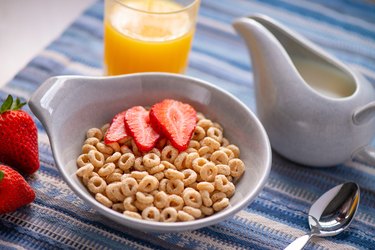
The claim is on the cereal box: Cheerios can help lower your cholesterol as part of a heart-healthy diet. But how exactly can a bowl of cereal help keep your cholesterol in check? For that you can thank the soluble fiber in whole-grain oats.
Read more: Are Cheerios Healthy?
Video of the Day
Video of the Day
The Cholesterol-Lowering Claim
Fiber, specifically soluble fiber, plays a key role in helping to reduce the absorption of cholesterol into your bloodstream, says Carmen Echols, MD, a board-certified family medicine doctor based in Stonecrest, Georgia. Consuming at least 5 to 10 grams of soluble fiber a day can help lower your LDL, or "bad" cholesterol, Dr. Echols says.
Since 1 cup of original Cheerios contains 1 gram of soluble fiber, the whole-grain oats cereal is one of many fiber-rich foods that can be helpful in lowering cholesterol, Dr. Echols says.
But has the maker of Cheerios ever gone too far with its cholesterol-lowering claims? Apparently so. At one time, the box told consumers that eating Cheerios could help "lower cholesterol 4 percent in six weeks."
In 2009, that claim prompted the U.S. Food and Drug Administration to send a warning letter to General Mills, noted in a press release by the National Consumers League. The letter warned that the popular cereal was misbranded and that its label claims made it sound as though Cheerios could prevent and treat high cholesterol and heart disease.
In response, General Mills defended the cholesterol-lowering benefits of Cheerios' soluble oat fibers and pointed to a University of Minnesota Heart Disease Prevention Clinic study providing data that soluble fiber from whole oats can lower LDL cholesterol by an average of 4 percent in six weeks. The 1997 study, though, was paid for by General Mills, points out Consumer Reports.
General Mills has since removed that specific claim from the box. It now says Cheerios "can help lower cholesterol as part of a heart healthy diet."
What to Do
Though the specific effects the cereal could have remain unclear, it's true that eating Cheerios will add key cholesterol-lowering soluble fiber to your diet.
Fiber can be broken into two categories: soluble and insoluble. Soluble fiber, which can dissolve in water, is the type that's credited for helping lower your cholesterol by reducing the absorption of cholesterol in your bloodstream, explains the Mayo Clinic. Mayo also notes that consuming 5 to 10 grams or more of soluble fiber a day can decrease your LDL cholesterol.
It's important, however, to read labels carefully. While the whole-grain oats in some cereals do contain soluble fiber, not all versions of a cereal have the same amounts of fiber, and some are packed with more sugar. For instance, one cup of original Cheerios has 1 gram of soluble fiber and 1 gram of sugar, but a cup of Honey Nut Cheerios contains less than 1 gram of soluble fiber and 12 grams of sugar, per General Mills.
Other Foods and Cholesterol
When it comes to breakfast foods capable of lowering your LDL cholesterol, consider oatmeal, which also contains soluble fiber. According to the Mayo Clinic, one serving of a breakfast cereal with oatmeal or oat bran provides 3 to 4 grams of fiber. Adding fruits like banana or berries will give you even more fiber.
Read more: Nutritional Value of Blueberries and Blackberries
But, soluble fiber isn't just something to incorporate into breakfast. Kidney beans, Brussels sprouts, apples and pears are also good sources of soluble fiber, according to the Mayo Clinic.
Also be aware of foods that put you at risk for high cholesterol. For instance, a diet that's high in saturated and trans fats can raise your cholesterol levels, according to the Mayo Clinic. Culprits include red meat, full-fat dairy products and commercially baked cookies and crackers.
In addition, Mayo says that having obesity with a body mass index (BMI) of 30 or greater, smoking cigarettes and not exercising can also put you at risk for high cholesterol.
- Carmen Echols, MD, family medicine physician, Stonecrest, Georgia
- National Consumers League: “NCL Applauds FDA for Warning General Mills for Misbranding Cheerios”
- General Mills: “General Mills Posts Response to FDA”
- Consumer Reports: “FDA Sinks Cheerios Health Claims; Calls Cereal an Unapproved Drug”
- Mayo Clinic: “Cholesterol: Top Foods to Improve Your Numbers”
- Mayo Clinic: “Nutrition and Healthy Eating”
- Mayo Clinic: “High Cholesterol”
- General Mills: "Honey Nut Cheerios"
- Mayo Clinic: "Dietary Fats: Know Which Ones to Choose"
- Mayo Clinic: "High Cholesterol"
Is this an emergency? If you are experiencing serious medical symptoms, please see the National Library of Medicine’s list of signs you need emergency medical attention or call 911.